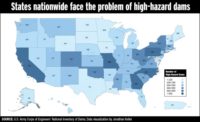Rush is concerned that failure to address MR&T needs now will have widespread, long-term detrimental effects on the nation’s economy. "The Corps already is hurting for funding for dredging, so their priorities will likely be to dredge from Baton Rouge to the Gulf Coast,"he says. "With all of this flooding, there will be a lot of need for dredging [of] the harbors all along the Mississippi River."
One of the Corps’ top priorities will be to rebuild the levee that was blown to activate the Birds Point-New Madrid floodway before fall floods begin. “Time is passing before the next high water, and we can’t construct four miles of levee overnight,” Rush says.
The Corps still is in the process of assessing damage, but by Aug. 12 it plans to present a list to Brig. Gen. Michael Walsh, commander of the Corps’ MVD and president-designee of the Mississippi River Commission. Walsh will then convene a meeting with governors of Louisiana, Mississippi, Arkansas, Tennessee, Kentucky, Missouri and Illinois to discuss it with them.
"This system is here because those seven states came together with a single loud voice in 1927, saying what existed was unacceptable and that we need a system," Whitney says. "At this point, we need that same coalition to come together and say we need that same support. Our path forward is a sensitive one, trying to build that coalition. It’s a political minefield, and we are stepping into it very carefully."








